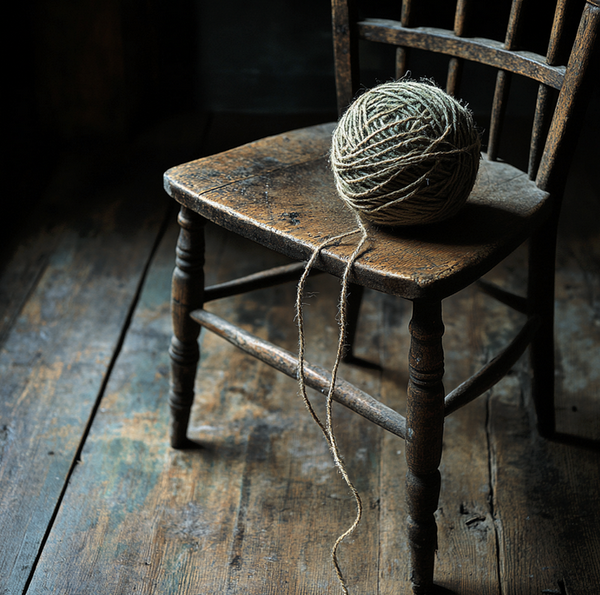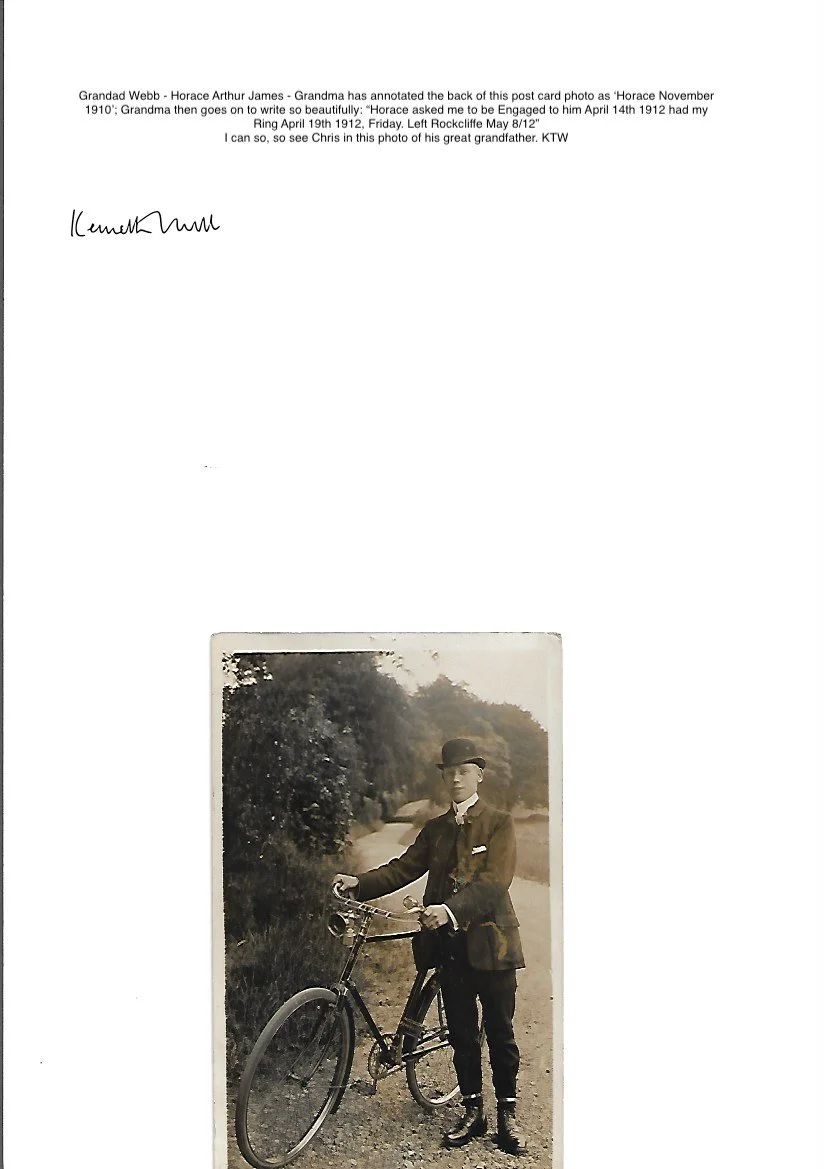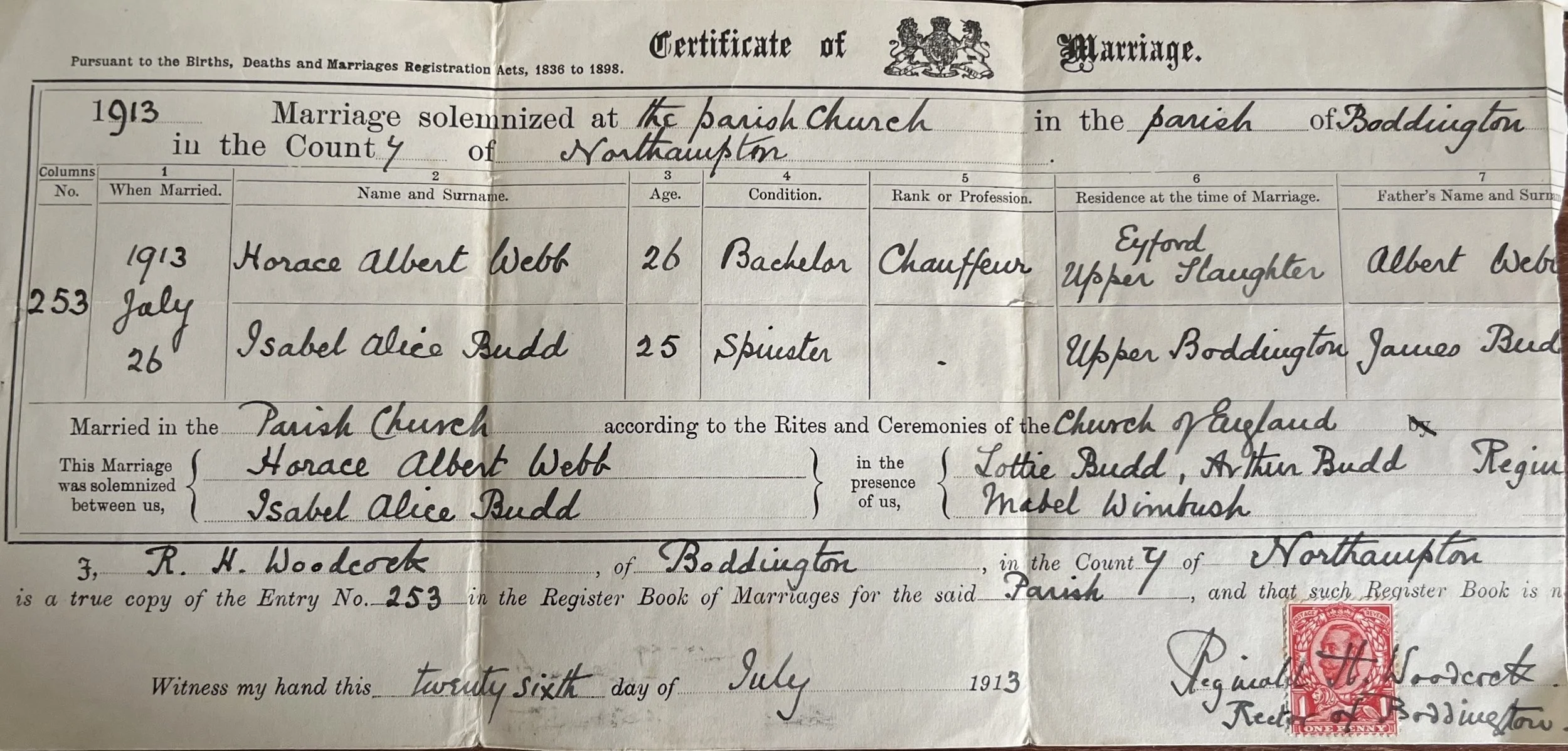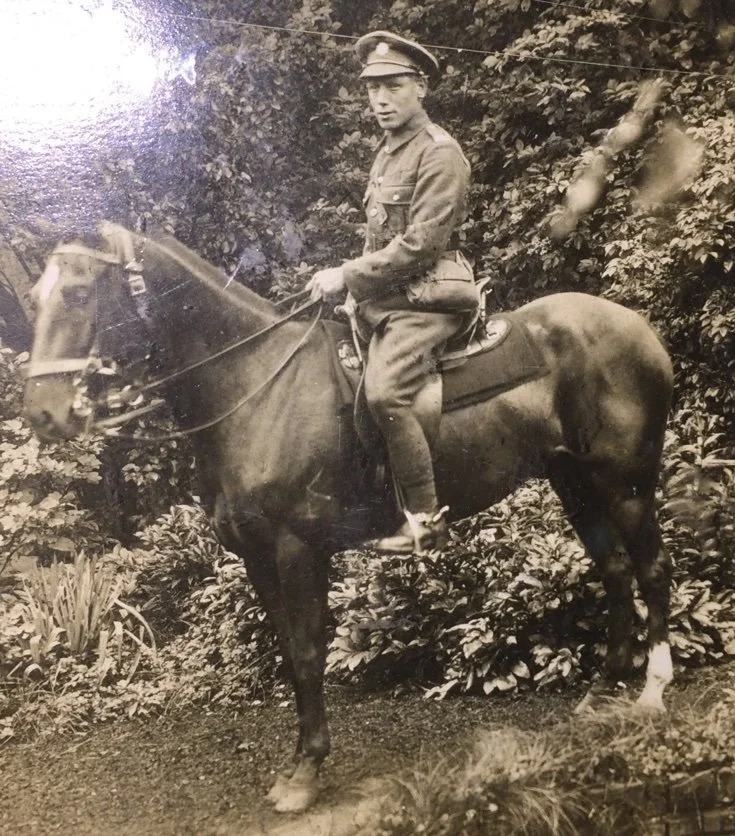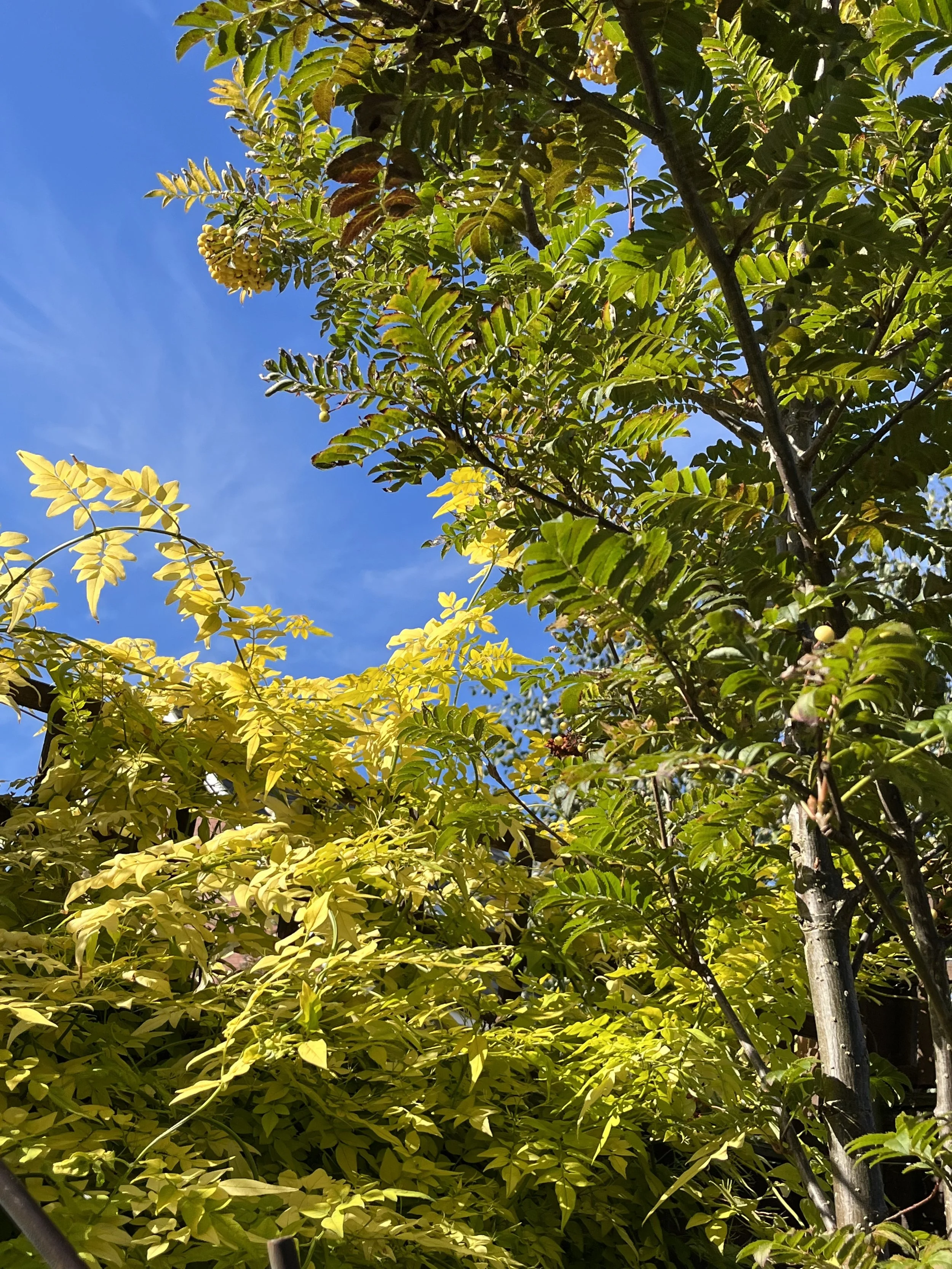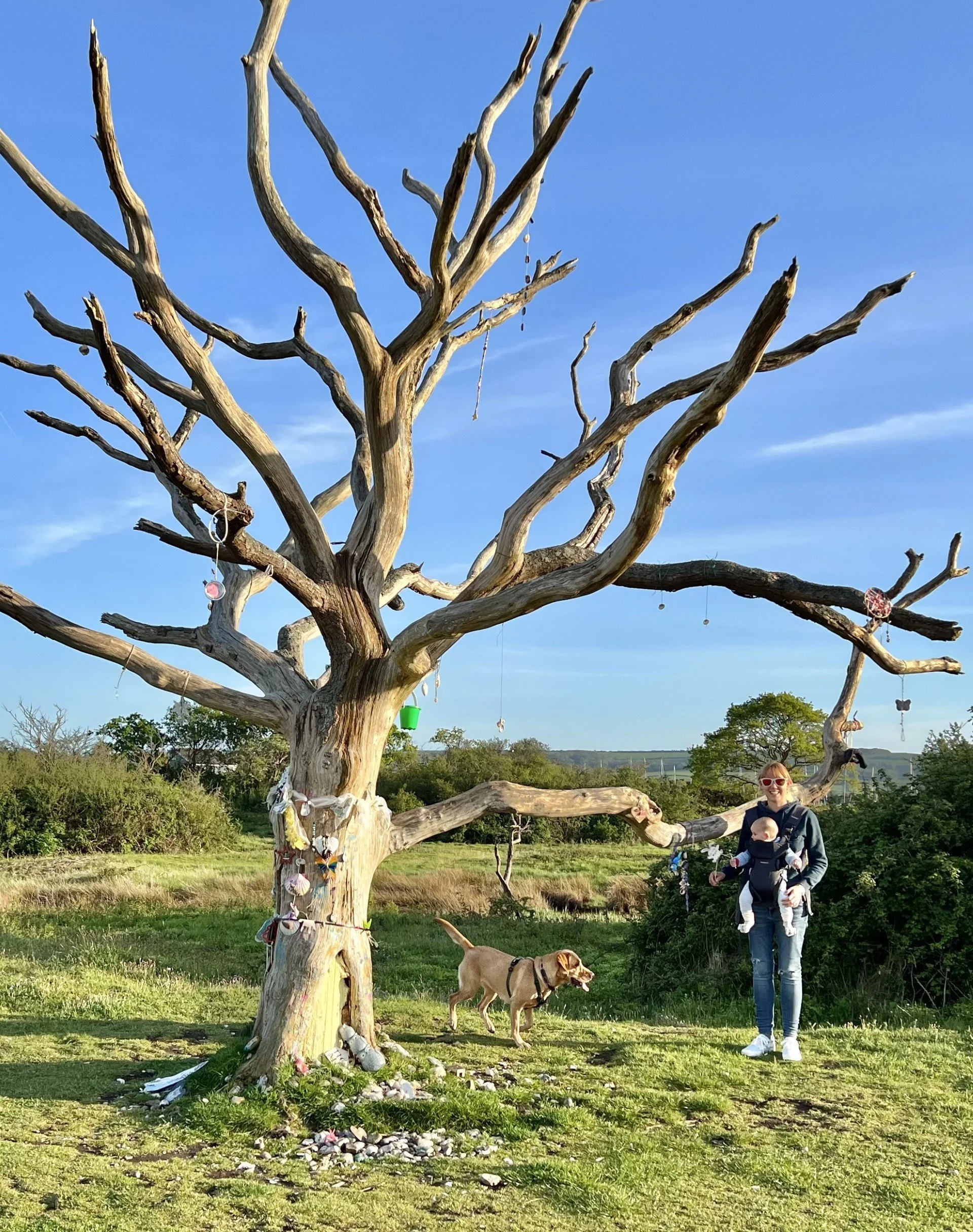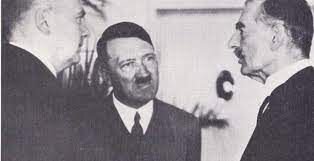WINDSOR STREET DAYS (New Edition 2025) Chapter 1 ~ Perspective

Isabel Alice Webb née Budd 1914
Windsor Street Days (New Edition 2025)
From City Boy to Shire Lad
Chapter 1
Perspective
Introduction
Perspective is subjective. We each have our own perspective of any ‘thing’ and all things; of any ‘one’ and all people; of any single event and all events.
That is natural. That is normal. That is usual.
When someone doggedly maintains that only their view is the acceptable view, that their recollection is the only acceptable recollection, that their interpretation is the only acceptable interpretation, then things unravel very quickly.
In its widest and most violent sense, a man in the Kremlin has only his perspective upon what he sees as the history of his people. That is but one step from that other man’s publication of his perspective on 18 July 1925, for what that man proceeded to do in regard to his perspective was, likewise, in its widest sense, terrifying.
The Ravelling
Perspective is subjective. We each have our own perspective of any ‘thing’ and all things; of any ‘one’ and all people; of any single event and all events.
WßD ~ Part I
In retirement, I enjoy researching my family’s history. My family comprises two branches, the paternal Webb and the maternal Marshall. From these branches have shot forth newer branches ~ Martin (Gloucestershire), Opacic (Hampshire), Fraser (Gloucestershire) Terry (Hampshire), Young (Northumbria Tyne and Wear), and Hope (also Northumbria and County Durham), Budd (Wiltshire) and Wimbush (Northamptonshire). If I go onto the Ancestry website, many other branches seem to be in place.
The Webb branch of this much larger tree ends with me.
Part of Windsor Street Days (WßD) comprises six chapters written by my father, Desmond Webb, for his twin granddaughters’ school projects and which I discovered in typescript in a briefcase in his study shortly after he died in early 2012. They will once again form an essential part of my story.
The family were happy to permit me to transcribe our father’s manuscript as it stands, in Desmond’s own distinct writing style. I have added photographs and other facts from photograph albums and diaries, including elusive recollections. That was a moving experience, for sure.
It is my experience as a writer that I hear the voice in a person’s writing, if I know them personally.
My father has a very different, formal writing style to mine; I too wrote in the same style because my father and I both learned the skill of formal military style writing. That, of course, has evolved and that is why there is a distinct difference now in the way that I write when I compare how I wrote and dictated documents in legal practice, now a long time ago. Indeed, my nephew Chris had not yet fathered his three sons with Meg, and so my grandnephews will never have known me or seen my style in that era unknown to them ~ beyond the veil, as the saying goes.
This is so for all of us, in every family.
When I transcribed my father’s manuscript, I could very clearly recall his voice.
When I practised law, I learned the skill of accurate audio-dictation. As my hands began the long, thankfully painless, journey with Dupytrens Contracture, so too, commenced the hands’ argument with the QWERTY |QWERTZ keyboard.
Aha! Methinks. The Dictaphone doth summons me!
Audio dictation was an essential discipline in legal work, which I had always loved when in practise. It started well, until it came to my father’s actual manuscript. Hearing his voice again - through my voice - with the same inflections was a tad too close, a heart-wrench, so I reverted to the keyboard.
WßD
The family story over two hundred years is of no particular note. A sheet written by my father’s cousin, Leslie Orris, traces the maternal family line of Budd. He had found ancestral Budds in the same village of Upper Boddington, Northamptonshire, ‘before the church was built’. In paraphrase ~ But Desmond, the church was built before the Norman Conquest, which church was registered in the Domesday 1086.
Our father’s cousin thus deduced that the family had a tentative reach back of some 1,000 years because, his note reports, the church was built, by his reckoning, 200 years before the Norman Conquest of 1066. Obviously, this needs to be looked into, but for the moment I deal with the 19th, 20th and 21st Centuries.
For me, the remarkable fact is that my ancestors, the Budd branch, lived in the small village of Upper Boddington right up until 1939. And whilst I can easily deduce that an excursion to, say, the small town of Evesham in Worcestershire might have been an infrequent event as the town was 34 miles away, and about a day’s journey on foot. But by bicycle, it was about four hours.
My great-grandfather, Albert Budd, served in the Indian Army as a breaker of horse, and ‘of some repute’ his daughter regularly reminded me until her departure in January 1966.
Those anecdotes coupled with the wonderful photograph of her husband on horseback in 1916 in France during the First World War quietly put in place my own very natural desire to ride. There is another photograph I came across, Horace not astride a horse but standing proudly by his beautiful pedal cycle (and which appears in this chapter).
Skills are passed down by generation from our ancestors! It is for us to decide whether or not we take them up or let them die out.
WßD
I mention the bicycle. Truly, a revolution! Because, as I read through the letters and postcards of the late 19th and early 20th centuries, it is quite clear that our grandparents and great-grandparents thought little of cycling a four-hour single distance for a brief visit before returning home that same day.
Upper Boddington
The Family lived in the cottage marked with an inked cross in front of the entrance. I’ve recognised the hedges, too, for if one steps inside the gateway, the path lead on a gradient behind the cottage, and where, once upon a time, our great-grandparents Albert and his wife Eliza Ann Budd née Wimbush pose for a rare photograph circa 1890s.
Upper Boddington Parish Church
I imagine that the two chancels in the foreground have seen many generations coming to and fro. As I stand in 2024 and move back to the year of Domesday 1086, I traverse 938 years. If I then add on our father’s cousin’s supposition that the church had stood some 800 years, having been built before 1066 (the Norman Conquest), perhaps I find myself in the year 866 AD (CE)?
Only a visit to the church in 2025 will enable me to establish the facts, as we say in law, haha!
The Pedal Cycle ~ Revolution!
My note says everything, so let me slip in the Marriage Certificate of our Grandparents ~ we know them of course as Grandma Webb and Grandad Webb. Isabel (1887-1966) and Horace (1887-1961).
Pte Horace Albert Webb, France 1916
Skills are passed down by generation from our
ancestors! It is for us to decide whether or not we take
them up or let them die out.
WßD ~ Part II
What is a family tree?
Simply, it is a euphemism for the many branches of a family, a record of the history of descendants as they pass into ancestry. They remain as important as the people, family, friends, neighbours and strangers surrounding us now. When we disconnect them, we commit a grave disservice to our ancestors.
During our lifetime there is often contention. We are angered by differing views and opinions, directions that branches of the tree take which do not follow our perceived normal pattern of growth. We love to watch TV soaps. We love to see families at war, telling ourselves that we are the exception, we are the norm. Then we recall that some parts of our family are not following ‘the norm’. But who established that norm? None of us. Normality is subjective. Normality is rarely objective. Objective normality is the antidote to war.
Yet we hold onto our image of the euphemistic family tree. That one branch, that tiny twig, is wayward, going off in its own direction! This is wrong. Out of step!
Erm!
Yet, when I look at any species of tree, no matter where I am, no matter in which country, I rejoice to see trees and I notice this one thing.
The myriad branches reach up to the sky from its trunk in search of light. Each branch follows its own direct route. Rarely, if ever, do I find the uppermost tips of those branches naturally conjoining. Those tips are each Branch Heads. Each branch head is independent, with its own stem into the root of the main trunk, and I see that the twigs will soon also become branch heads in their own right, also doing exactly the same. Reaching out for space to make their direct path to light, to the warmth of the Sun, to nourishment.
Here, in my euphemism, is reality.
I watch any TV soap, and all soaps reflect this outward reach for light, for freedom, for independence, the right to do things “in my own way, our own way.”
The trunk of the tree is solid. The family is solid. I cannot guarantee that my children will go in the direction that I would prefer. Reflecting upon setting my own direction, I‘m sure it is not the direction that my parents had in mind, nor indeed their parents for them.
When I see the fairy-tale tree,
very quickly I see
where that fairy-tale needs to be placed.
And then I can rejoice
in the incredible richness of a tree – yes, a family tree – that moves upward and outward
in all directions.
“Normality is subjective.
Normality is rarely objective.
Objective normality is the antidote to war.”
WßD ~ Part III
I end with one piece of advice honed upon the anvil of argument and differing opinion. It is this. I write only from my personal perspective. Outwardly accepted, only time reveals that there might be contention, a different viewpoint ~ a different perspective.
If, for example, five people observe the same event simultaneously, the statements of evidence will be similar in many respects but wildly differ in other respects. There will be no meeting of the minds. No agreement. No consensus.
This wild differential, as I call it, is the devil’s card in your pack.
I lose count of the times I am informed by friends that they are writing their family history. Think carefully. It is not an easy route. From the moment you take the first step on that route, work quietly without a running commentary.
“What is the Family tree?
Simply, it is a euphemism for the many branches of a family, a record of the history of descendants as they pass into ancestry. They remain as important as the people, family, friends, neighbours and strangers surrounding us now. When we disconnect them, we commit a grave disservice to our ancestors. ”
WßD ~ Part IV
In regard to the old Windsor Street Days I had not expected that my last visit to the manuscript would mark that turning of the key in the latch of that manuscript one final time. But it is not accompanied by sadness.
The Ken Webb writing this is not the Ken Webb who wrote its first chapter ten years ago.
In a phrase, I have gone full circle and found myself back in my city, Liverpool, with Liverpool’s outlook, Liverpool’s tolerance, and her acute sense of the importance of freedom and democracy. And this sense is not devoid of Liverpool’s tendency to rebelliousness.
I remember with great affection being reminded of the need to keep a new perspective when I arrived in May 2003. It was this.
“Oh no. Liverpool is not part of England. It is in England, yes. But it is separate from England. If you keep this in mind in your work up here, you won’t go far wrong.”
That is wise advice, indeed.
WßD ~ Part V
And so I arrive at this juncture, which I tend to think of as being from City Boy back to Shire Lad, when I returned to Gloucestershire from Liverpool, Merseyside and Lancashire after 14 years.
The world I write of in Windsor Street Days in the thirty-two chapters with ten additional draft chapters - mere frameworks of intent - give a glimpse of a world and lifestyle that is now so far removed from today, that they seem irrelevant. But they are not. Because I was, and still am, a part of that world, as we all are.
We have great historians and archivists, writers and poets.
We have great historians and archivists, writers and poets. KTW
Over the past ten years, many people in many countries have been popping in and out of Windsor Street Days. This following and interest means everything. Thank you, all.
Right. Now, have I got everything?
Wallet, notebook, iPhone, back door key, outhouse key, front door latch key.
Something’s missing… Ah, thanks.
A million fragmented memories make up the total of who I am and what I am.
Right.
I pause.
Hang on, what does Professor David Adetayo Olusoga OBE call it?
Ah, yes. A House Through Time.
For me, Windsor Street Days has been A House in My Time. My thoughts, my perspectives only.
I am also part of a rich and diverse world community. In some parts of the world we are outlawed. This sense of ‘outlaw’ is sadly increasing, even in countries that were previously tolerant, supportive, embracing. In some parts of hitherto liberal regimes that have been in the vanguard of the LGBTQI+ Worldwide Community there is evidence of back-tracking. A totalitarian state, on Saturday 23 September 2023, rebuked the United Nations General Assembly with a strident harangue, insistent that all of us must recognise that a New World Order is already here.
I am who I am - Ich bin war ich bin
I am what I am - Ich bin was ich bin
WßD ~ Part VI
It is now Saturday, 28 October and Part III is that very happy addendum to Chapter 1. My nieces, twins, have sent delightful e-mails. As I write, Caroline and Suzie are having a Hen Night at some secret location organised by Suzie. Both give a very positive comment. A perfect “touching of the rudder”.
I mention the fairy-tale tree, only to discover that there is a real fairy-tale tree at Bembridge on the Isle of Wight.
Suzie writes,
Hi Uncle Ken
Thank you for sending this over, I read it at 4am while Theo was nursing (he’s never been a good sleeper - first slept through the night a month ago and that was a one off!) - anyway, he is teething so most nights I’m up with matchsticks in my eyelids so gave me the chance to have a read (he also doesn’t nap well in the day, so grabbing 20 mins to myself is rare!)
Don’t apologise for many words, I love reading your messages. And it’s nice as I’m all too often spending my days at work trying to limit words in emails etc to keep actions to the point, at Heathrow I was getting 150 emails a day sometimes so sifting what was important /required became a necessity!
The opening chapter is excellent, I love the analogy of our family ‘tree’ and it reminds me of a ‘fairy tree’ at Bembridge Harbour on the Isle of Wight, which is decorated by families each year with trinkets and keepsakes. It stands proud at what was one of our favourite spots to visit on Flying High - pic attached.
I also look forward to teaching Theo many of the skills and learnings from our family that you highlight, including one day (when he’s old enough to understand the history) visiting the memorial in Germany I’m sure. I have put the family tree print out into his record book already, which documents his first year and family etc.
The end phrase ‘I am who I am’ is just perfect.
Have a great weekend. Caroline is currently on route from Newcastle as we’ve her Hen Do (a civilised one!) celebrations.
Sending lots of love xx
Suzie with Theo, Poppy and Jason (on tother side of Lens) at The Fairy Tree at Bembridge Harbour on the Isle of White.
Caroline writes,
Dear Uncle Ken, I’ve just read this through!
Firstly I never realised the Budds traced back over 1000 years 😳 And, secondly I remember that school project vividly, and with Grandma, like Grandad telling us her story. I’m sure Mum has kept the folders we made with them.
I’ve never thought of a family tree like that until you said it and now it’s glaringly obvious. The strong family unit but each bringing a new bud and twig - and in two weeks a new bud will grow.
On the note of ‘being delusional’ - a little delusion never hurt anyone, and brings about innovation and creation :) If I’d not been a little deluded, I wouldn’t have set up my business!
I’ve just arrived down to Suzie’s - I spent the day driving down south ready to celebrate with my hens tomorrow :) I have no idea what we are doing.. Suzie has kept a very good secret whatever it is!
I hope you have a lovely weekend
Caroline xxx
Caroline ~ a new bud and twig - and in two weeks a new bud will grow.
So, rest assured reader, my nephew and my nieces keep me on track, and have a nack of turning a negative into a positive, especially when Unk is becoming negative!’
And what a splendid tree at Bembridge. What a wonderful thing that this gives to all, a home for trinkets and keepsakes.
Now THIS is what family life is all about. And I’ll end this chapter with a glimpse of the portraits that have featured often on the websites, and which I’ve always called Life is Good, Kenneth Webb Senior in 1941, and his younger brother our father and grandfather Desmond Budd Webb around 42 years, also affirming that Life is Good.
Desmond Budd Webb 1983-4
Life is Good
Kenneth Ernest Webb 1941
Life is Good
10 December 2024
All Rights Reserved
LIVERPOOL
© 2025 Kenneth Thomas Webb
Digital Artwork by © 2025 KTW © 2025 IBM unless otherwise credited
Photographs are from the family archive
With La Roche on Aggs Hill 1973 on my way to the Gallops on Cleeve Hill, the sister Gallops to my other delight, the Rides of Worcestershire. © 1973 KTW
Ken Webb is a writer and proofreader. His website, kennwebb.com, showcases his work as a writer, blogger and podcaster, resting on his successive careers as a police officer, progressing to a junior lawyer in succession and trusts as a Fellow of the Institute of Legal Executives, a retired officer with the Royal Air Force Volunteer Reserve, and latterly, for three years, the owner and editor of two lifestyle magazines in Liverpool.
He also just handed over a successful two year chairmanship in Gloucestershire with Cheltenham Regency Probus.
Pandemic aside, he spends his time equally between his city, Liverpool, and the county of his birth, Gloucestershire.
In this fast-paced present age, proof-reading is essential. And this skill also occasionally leads to copy-editing writers’ manuscripts for submission to publishers and also student and post graduate dissertations.


